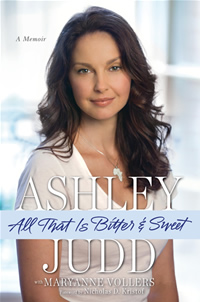Firing Back
Ashley Judd has finally heard enough from her misogynistic “fans”
April 13, 2012 Chapter 16 readers know Ashley Judd as the author of a memoir, All That is Bitter & Sweet, and as an advocate for children with AIDS and victims of sexual violence. Nashville readers know her as Naomi’s daughter and Wynnona’s little sister. But to the rest of the world, Ashley Judd is a celebrity, an award-winning actor who’s had leading roles in films like Smoke, Kiss The Girls, and De-Lovely. And because she’s a celebrity, star rags and bloggers have always felt entitled to comment on (read scathingly criticize) her appearance. But Judd’s not taking it any more.
Weeks of speculation about her “puffy” face followed Judd’s appearance on a Canadian television show to promote her new series, Missing. A statement by her publicist assured the public that Judd had not undergone plastic surgery or filler injections: the puffiness was a side effect of several rounds of prescribed steroids to treat an intractable sinus infection. Nevertheless, assumptions continued to fly, cruel assessments to proliferate. In the comment sections of reports all over the media, anonymous readers called Judd “a cow,” “a pig,” and worse. Mainstream media outlets hired plastic surgeons to watch the interview clip and explain the kind of “work” she’d likely had done.
 Finally, on Monday, Judd fired back in an essay for The Daily Beast:
Finally, on Monday, Judd fired back in an essay for The Daily Beast:
News outlets with whom I do serious work, such as publishing op-eds about preventing HIV, empowering poor youth worldwide, and conflict mineral mining in Democratic Republic of Congo, all ran this “story” without checking with my office first for verification, or offering me the dignity of the opportunity to comment. It’s an indictment of them that they would even consider the content printable, and that they, too, without using time-honored journalistic standards, would perpetuate with un-edifying delight such blatantly gendered, ageist, and mean-spirited content.
But the real point of Judd’s essay is not to excoriate the media for their unprofessional behavior as journalists. The real point is to make ordinary people reconsider their assumptions, to understand that subjecting women—all women, and not just celebrities—to constant, judgmental scrutiny is a form of misogyny, a mindset that women engage in as fiercely as men do: “This abnormal obsession with women’s faces and bodies has become so normal that we (I include myself at times—I absolutely fall for it still) have internalized patriarchy almost seamlessly. We are unable at times to identify ourselves as our own denigrating abusers, or as abusing other girls and women.”
Judd, who ordinarily makes a practice of avoiding any articles about herself, refusing to read even interviews she’s given, decided to respond this time because of the opportunity to change the conversation:
If this conversation about me is going to be had, I will do my part to insist that it is a feminist one, because it has been misogynistic from the start. Who makes the fantastic leap from being sick, or gaining some weight over the winter, to a conclusion of plastic surgery? Our culture, that’s who. The insanity has to stop, because as focused on me as it appears to have been, it is about all girls and women. In fact, it’s about boys and men, too, who are equally objectified and ridiculed, according to heteronormative definitions of masculinity that deny the full and dynamic range of their personhood. It affects each and every one of us, in multiple and nefarious ways: our self-image, how we show up in our relationships and at work, our sense of our worth, value, and potential as human beings.
The essay instantly went viral, covered even by the media outlets Judd singles out for reproach in the essay itself. The Huffington Post, for example, just named Ashley Judd its “Influencer of the Week.”
For more updates on Tennessee authors, please visit Chapter 16’s News & Notes page, here.